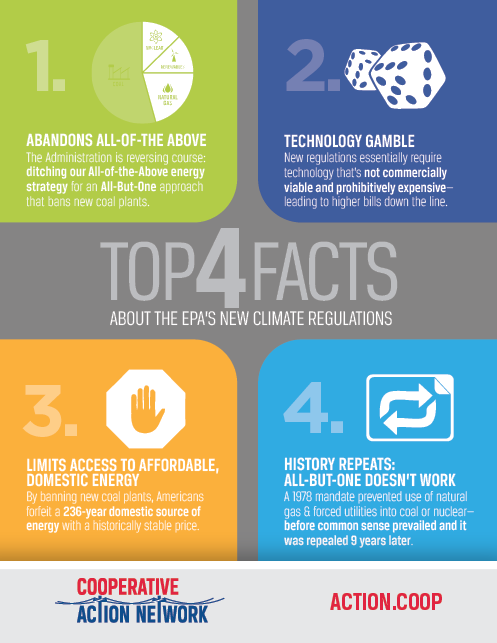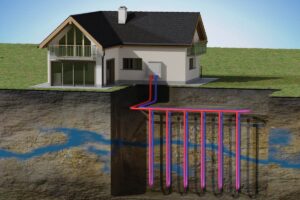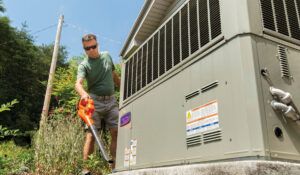By James Dulley
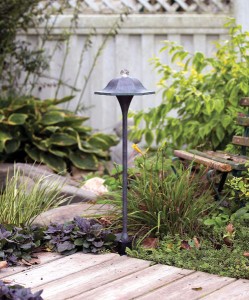
A tall die cast metal landscaping light brightens a large area to double as a security light. The large diameter top limits light pollution of the night sky.
Source: Hadco
Dear Jim: I need to add outdoor lighting for security at my home. I’d also like to use the lights for entertaining. How can I brighten outdoor spaces without driving up my electric bills? – Paul H.
Dear Paul: Outdoor lighting can be effective for security, but drives up utility bills if done improperly. Security lights are not always best for entertaining, and vice versa.
Make your security and entertaining lighting plans independently, then check to see where they overlap. Security lighting is usually on all night; entertainment lighting is not. Choosing the proper security lighting has a greater impact on your utility bills.
Before you consider adding outdoor security lighting, make other low-cost security improvements to your home. Make sure window latches lock securely, install bump-resistant door deadbolts and consider an alarm system.
Once you feel the perimeter of your home is relatively secure, plan your lighting. Do an outdoor walk-around inspection of your house at night to see where additional lighting might help. Sometimes there is enough brightness from a neighbor’s home to illuminate otherwise dark, suspect areas.
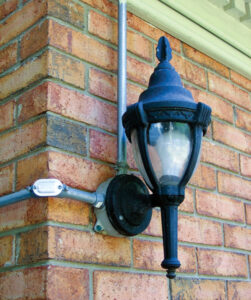
When installing outdoor security/
entertainment lighting, always follow local electric codes. This installation uses rigid aluminum conduit. Source: James Dulley
Prioritize lighting need areas. Installing just two 150-watt security lights and keeping them on all night can increase your electric bill by more than $100 per year.
Keep in mind, the wattage of a light bulb does not determine how much light it produces. Wattage refers to how much electricity a bulb uses. Instead, look for light output—measured in lumens—on bulb packaging.
Compact fluorescent lamps (CFLs) and light emitting diodes (LEDs) produce more lumens per watt of electricity compared to standard incandescent bulbs. For example, an L22 array LED fixture uses less than 25 watts to produce the same light output (about 1,800 lumens) as a 100-watt incandescent bulb.
When planning outdoor lighting, make an effort to minimize nighttime light pollution. Bright lights create a problem for wildlife and can be annoying to neighbors. If you install floodlighting, mount a directional light shield over it. I can barely see the stars on a clear night due to the excessive lighting in my subdivision.
It is a misconception that brighter lights provide more security. Lower lighting levels are more effective because it’s difficult for the human eye to quickly adjust from a very bright area to darker area. If lighting is less bright, it’s easier to see movement in darker areas where someone might be hiding.
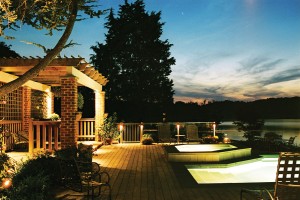
Motion-sensor lights are some of the most efficient and effective for security. When the light comes on, a would-be thief assumes he has been seen. They also catch neighbors’ attention. Select one with two-level lighting. You can switch it on for low-level background lighting; it only switches to full brightness when motion is detected.
Wherever there is access to the full sun, consider solar-powered motion-sensing floodlights. Spend extra for an ample battery pack (measured in watt-hours). These lights continue to operate even after a few consecutive cloudy days with little recharging sunlight.
If you plan to install low-cost standard 120-volt outdoor lighting fixtures, try using CFLs. These only use one-quarter as much electricity as standard incandescent bulbs and last at least 10 times longer. The overall savings will pay back their higher cost many times over. CFLs do not always work well in cold outdoor temperatures, and take a little while to reach full brightness. Try one or two first, and read the packaging to see if the bulb is intended for outdoor use.
LEDs, another super-efficient lighting option, are not affected by the cold. With a bright white light output, LEDs last up to 50,000 hours. Their light output is directional, so they are best for lighting specific targeted areas.
To light a larger area for an entire night, LPS (low-pressure sodium) fixtures are efficient. The fixtures are fairly expensive and they start up very slowly to reach full brightness. The light quality is monochromatic (yellowish) so they would only be applicable for security and not for entertainment lighting.
The following companies offer efficient outdoor lighting: Energy Focus, (888) 704-2276, www.energyfocusinc.com; Hadco, (800) 331-4185, www.hadcolighting.com; Idaho Wood, (800) 635-1100, www.idahowood.com; Kim Lighting, (626) 968-5666, www.kimlighting.com; and Wave Lighting, (877) 870-9283, www.wavelightingusa.com.
Send inquiries to James Dulley, Illinois Country Living, 6906 Royalgreen Dr., Cincinnati, OH 45244 or visit www.dulley.com.



